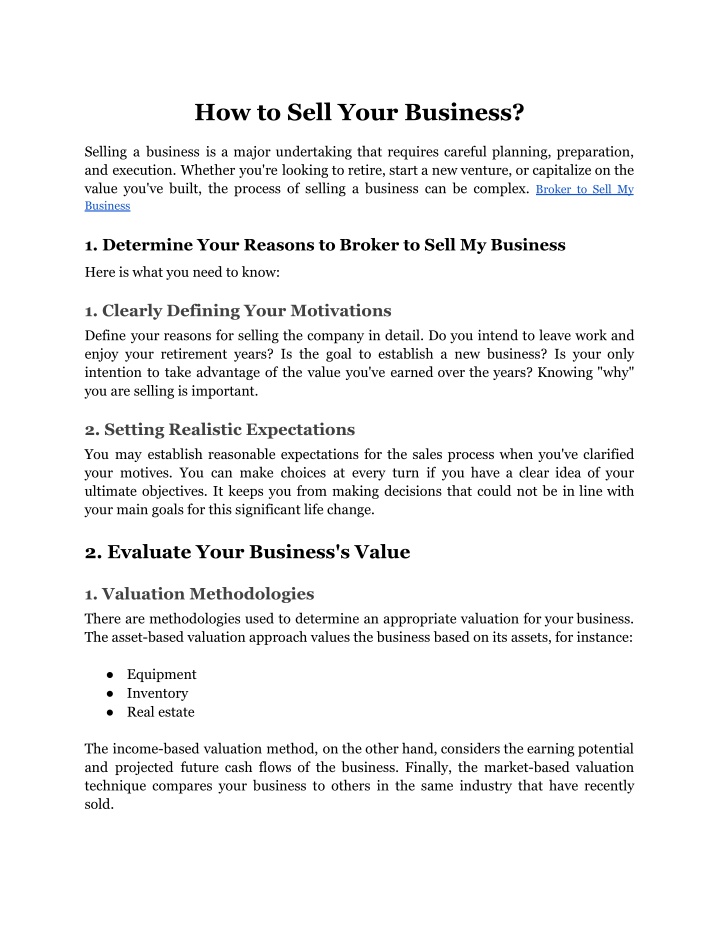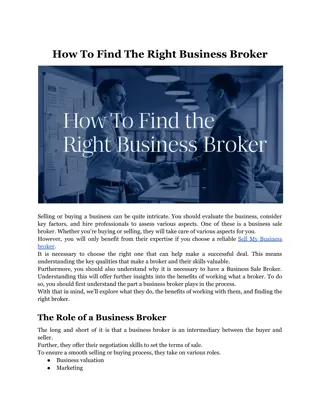
How to Sell Your Business_
Selling a business is a major undertaking that requires careful planning, preparation,nand execution. Whether you're looking to retire, start a new venture, or capitalize on thenvalue you've built, the process of selling a business can be complex. Broker to Sell MynBusiness
Download Presentation

Please find below an Image/Link to download the presentation.
The content on the website is provided AS IS for your information and personal use only. It may not be sold, licensed, or shared on other websites without obtaining consent from the author. If you encounter any issues during the download, it is possible that the publisher has removed the file from their server.
You are allowed to download the files provided on this website for personal or commercial use, subject to the condition that they are used lawfully. All files are the property of their respective owners.
The content on the website is provided AS IS for your information and personal use only. It may not be sold, licensed, or shared on other websites without obtaining consent from the author.
E N D
Presentation Transcript
How to Sell Your Business? Selling a business is a major undertaking that requires careful planning, preparation, and execution. Whether you're looking to retire, start a new venture, or capitalize on the value you've built, the process of selling a business can be complex. Broker to Sell My Business 1. Determine Your Reasons to Broker to Sell My Business Here is what you need to know: 1. Clearly Defining Your Motivations Define your reasons for selling the company in detail. Do you intend to leave work and enjoy your retirement years? Is the goal to establish a new business? Is your only intention to take advantage of the value you've earned over the years? Knowing "why" you are selling is important. 2. Setting Realistic Expectations You may establish reasonable expectations for the sales process when you've clarified your motives. You can make choices at every turn if you have a clear idea of your ultimate objectives. It keeps you from making decisions that could not be in line with your main goals for this significant life change. 2. Evaluate Your Business's Value 1. Valuation Methodologies There are methodologies used to determine an appropriate valuation for your business. The asset-based valuation approach values the business based on its assets, for instance: Equipment Inventory Real estate The income-based valuation method, on the other hand, considers the earning potential and projected future cash flows of the business. Finally, the market-based valuation technique compares your business to others in the same industry that have recently sold.
Read More Articles: How Does the Cost of Flying Privately Compare to First-class Commercial Travel? 2. Utilizing Professional Expertise While you can attempt to value your business yourself, it is highly advisable to utilize professional valuation expertise. Consulting a specialist in business valuation ensures you receive an objective third-party assessment. This analysis will provide an accurate understanding of what your business is truly worth in the current market environment. 3. Prepare Your Business for Sale 1. Getting Organized Preparing your business for sale requires an organized approach to assembling all of the key information and documentation. From a financial perspective, you'll want all: Tax returns Profit and loss statements Balance sheets Other financial records updated and organized As a result, these documents should be easily reviewable by prospective buyers performing due diligence. 2. Management Succession Make sure you have a capable management team in place if you want to completely quit the company as part of the sale. Maintaining a competent leadership team enables a smooth transition and instills confidence in purchasers over the business's continued operations under new ownership. 3. Asset Documentation Make a complete list of every asset that is being sold together with the company. Both actual and intangible assets are covered by this, including inventories and equipment. All of the supporting paperwork for these assets should be easily accessible. 4. Identify Potential Buyers There are a few crucial areas to be aware of when it comes to finding possible customers for your company. Businesses in your vertical market or sector are considered strategic purchasers. They could want to buy your company to get more market share, take possession of your assets or intellectual property, or get rid of a rival.
Investment groups and private equity organizations are examples of possible buyers that are financial buyers. They might see your company as an investment vehicle, intending to maximize profits and boost worth before closing. Finally, you could explore an inside purchase, where current employees or management acquire ownership. This internal transition often allows for continuity and a smoother handoff process. 5. Market Your Business Once you've identified ideal categories of potential buyers, it's time to start marketing your business as for sale. One avenue is hiring an experienced business broker. These professionals specialize in facilitating the confidential sales process for businesses. They leverage an existing network of buyers and have expertise in negotiating favorable deal terms. You can also explore more discreet marketing avenues, like online listings for businesses for sale or advertisements in industry-specific publications. This approach allows you to maintain confidentiality from vendors/customers during the process to avoid disruptions. 6. Buyer's Assessment Before advancing too far down the road toward a sale, any serious buyer is going to want to complete thorough due diligence. This process involves the buyer investigating all aspects of your business's operations and financial health. They'll want to examine your books, scrutinize legal and customer records, analyze future forecasts, and assess overall strategic opportunities. The buyer will also be looking into your own personal background, credit history, and plans as the current owner. They need to get a full understanding of the situation they would be walking into as the new owner. 7. Seller's Disclosure For a smooth due diligence process, you provide full transparency to prospective buyers reviewing your business. You'll need to open up all records related to financial performance, legal/regulatory matters, employee data, and operational systems. Holding nothing back is key to enabling a seamless transaction. Attempting to misrepresent or withhold information often leads to deal-killers down the road.
Read More Articles: What are the Benefits of Implementing Structured Cabling in an Office Environment? 8. Negotiate and Structure the Deal Agreeing on Terms If due diligence goes smoothly and both parties are satisfied to move forward, the next stage is negotiating and structuring the actual deal terms and mechanics of the sale. Purchase Price You'll need to determine an appropriate valuation and final purchase price that makes sense for both the buyer and seller. Your earlier professional valuation work should guide this, but buyers may push for a lower number. Payment Structure Another key deal point is determining the payment schedule and structure for the negotiated price. Will it be all cash upfront? Or a combination of upfront and future installment payments contingent on performance (an earn-out)? The seller may also explore options for financing part of the deal themselves. Deal Structure In an asset sale, the buyer is purchasing specific assets like property, equipment, IP, inventory, etc. In contrast, a stock sale involves the buyer purchasing the company's actual shares/equity to assume full ownership. Financial and Legal Advice During this dealmaking stage, it is important to have proper legal representation and experienced accounting/tax advice. You want any sale transaction structured in a way that protects your interests, minimizes future liabilities, and optimizes tax implications. Conclusion As you get ready for retirement, are you trying to get the greatest price while selling your company? You deserve to enjoy retirement doing the things you love. We begin by figuring out what your company is worth. Afterward, we assist with all the documentation and discussions up until the transaction is finalized. We aim to make the selling process easy for you. Trust Sell My Business broker to help you achieve top dollar and a quick sale.











